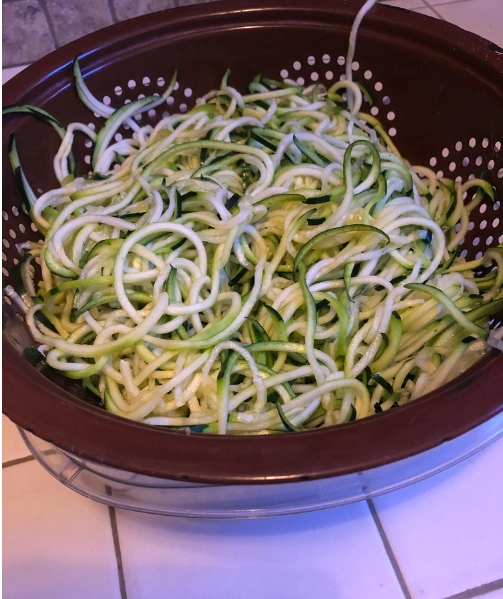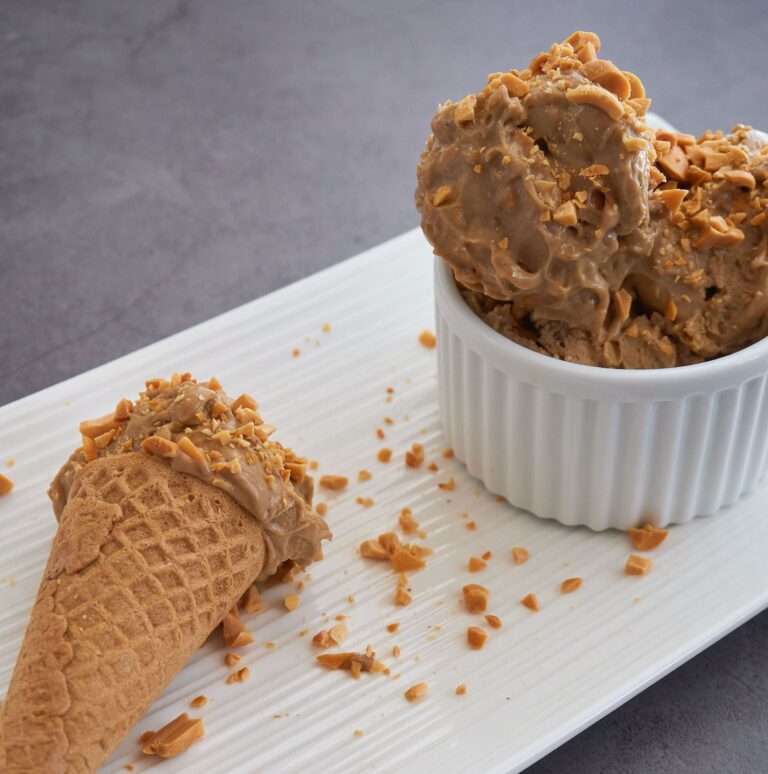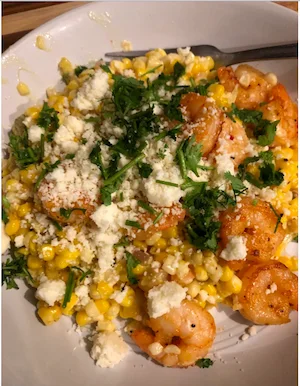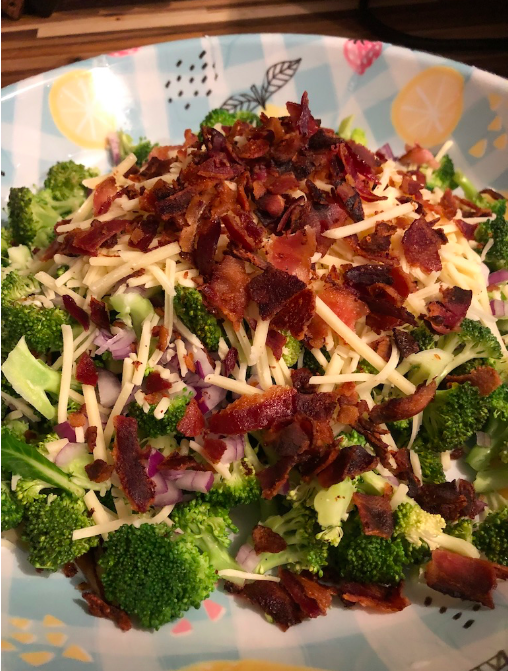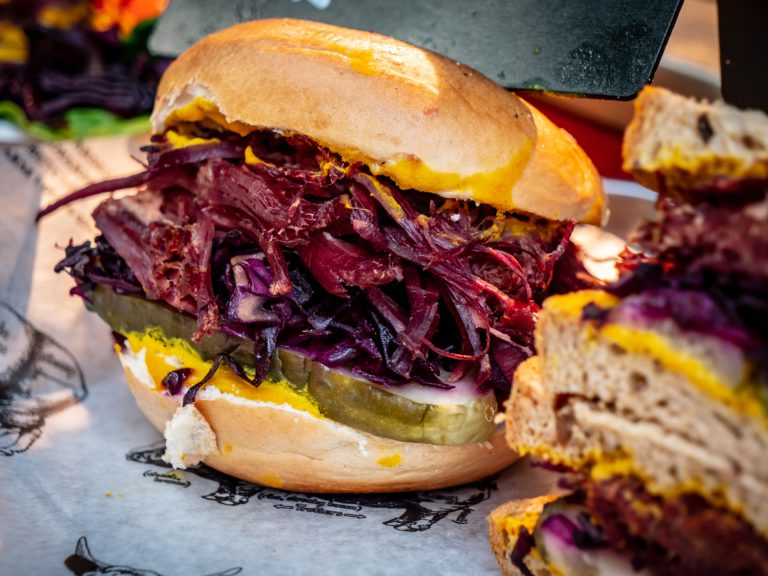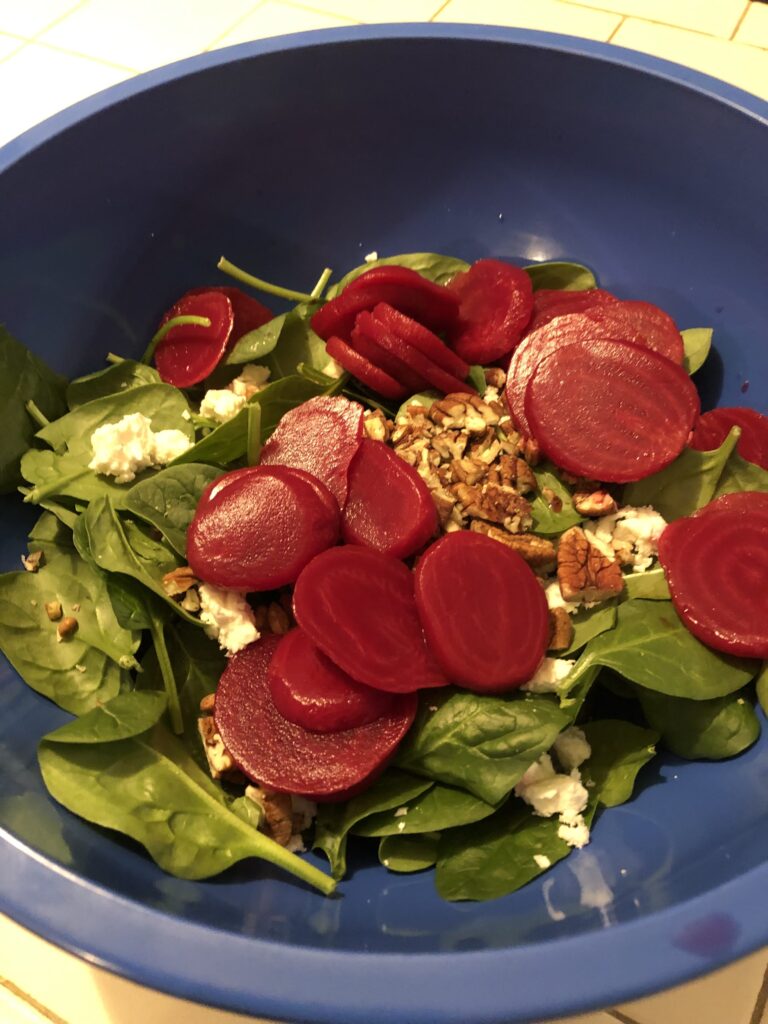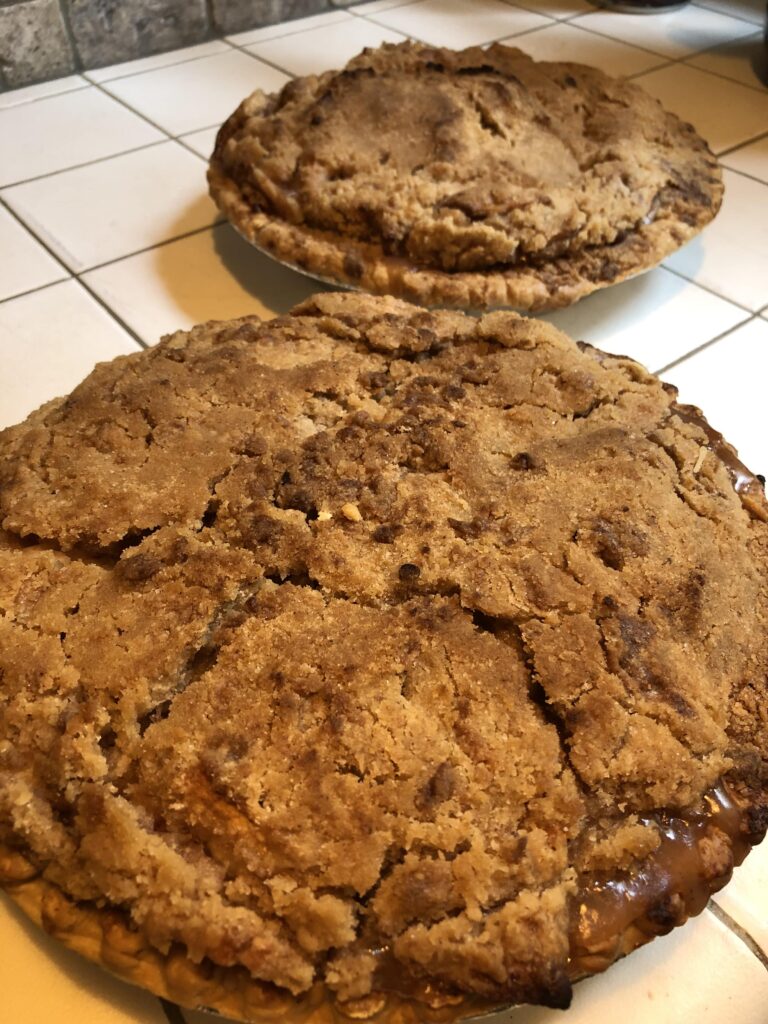Soggy zoodles? The secret to zoodles that aren’t soggy or watery
(This post may contain affiliate links. See the full affiliate disclosure here for more info.)
Zucchini noodles AKA zoodles have given those of us trying to eat low-carb a way to incorporate noodles into our meals. No, they aren’t quite as carb-satisfying as regular noodles, but they are so much healthier.
While there are many ways to prepare them, they often turn out soggy, watery, and limp. After preparing them many ways and many times, I’ve found a couple of ways that seem to work the best to prevent soggy zucchini noodles.
But you don’t have to stick with the same preparation method for every dish. Mix it up and try sauteing, baking, and roasting them.
Zoodles are nutritious
Zucchini squash has high nutritional value (although actually, it’s a fruit) that is also very versatile.
Zucchini is:
- Low in fat and carbs
- Rich in vitamins A, C, and K, and manganese, potassium, magnesium, folate, copper, phosporus, and thiamine
- Rich in antioxidants such as
- Carotenoids that fight oxidative damage to cells
- Lutein and zeaxanthin that work in the retina of the eye to improve vision and prevent age-related vision problems, macular degeneration, and cataracts
- High in water and fiber, both of which contribute to digestion
- Fiber is a probiotic that can feed the bacteria in your gut to keep them healthy
- Consuming as little as 2–10 grams of soluble fiber per day for around 1–2 months decreased total cholesterol levels by an average of 1.7 mg/dl and “bad” LDL cholesterol by 2.2 mg/dl
- Fiber and water make you feel full without adding calories
- A good substitute for pasta that does not raise glucose levels like carbs do. Low carb diets are healthy diets and especially good for people with type 1 and type 2 diabetes.
How to make zoodles
I’m not sure that you can make zoodles without a spiralizer or other device that cuts perfect narrow slices that curve over themselves. I have this one and I can honestly say that it’s fun to use.
It comes with blades for spiralizing in 4 sizes corresponding to angel hair, spaghetti, linguini, and fettuccini, as well as ribbons. The pieces are stored on the spiralizer and are very easy to wash.
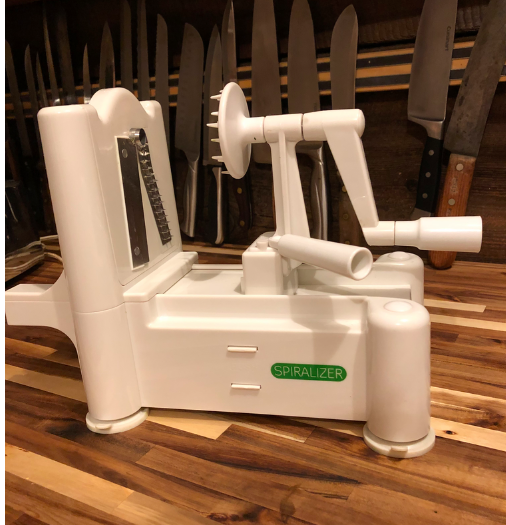
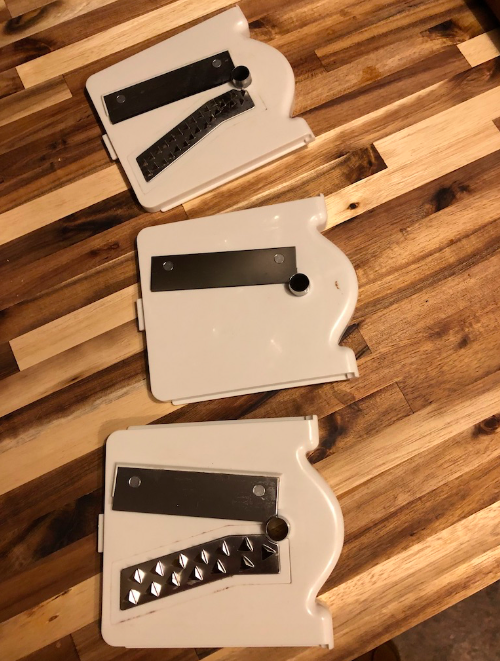
Be sure that the suction firmly attaches to the countertop.
Simply cut the end off of one fresh zucchini, stick it onto the hollow metal peg, and twist to produce spiralized zucchini. Put the vegetable peeler away because the peel helps to create good zucchini pasta.
The zoodles come out the end and the “core” will extrude through the opening in the metal peg. Zucchini seeds are small and soft, and you don’t need to remove them before spiralizing. Even large zucchinis make great zoodles.
How to make zoodles that aren’t soggy
The most important note about making zoodles is that they shrink before your eyes. You know how zucchini shrinks when you saute it as a vegetable? Well, zoodles do the same thing.
There are many different ways to prevent soggy zoodles. I’m presenting two ways that I think are the best methods.
However, you make them, be sure to make enough. You will probably need a small mountain of spiralized noodles.
How to make baked zoodles
In the pictures, I used 3 small zucchinis and one medium-large one. Just for reference, my husband and I ate the whole thing.
Of course, I can’t say for sure, but I think that salting and sweating the zoodles is the key. Zucchini has high water content and I do think getting rid of all you can is a good idea. The salt will help the zucchini release moisture. Others who make baked zoodles don’t do this step (steps 2–5 below), but mine turned out great this way.
1. Wash the zucchini and spiralize the noodles.
2. Add them by the handful to a colander and salt each layer generously. Continue to add noodles and salt until all zoodles are added. Mix them by turning them over and over a few times in the colander.
3. Put the colander over a bowl to catch the released excess moisture. I ended up with ½ cup of liquid from my zoodles.
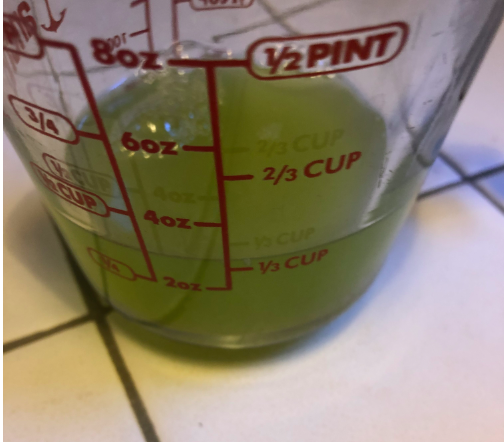
4. Rinse the salt off over running water. I know this might seem counter-intuitive because we just tried to remove the moisture, but you don’t want all that salt in your dish.
5. Empty the zoodles onto a linen kitchen towel and gently use paper towels to blot the excess water out of them. Zoodles are tender and you don’t want to break them. If you have time, you could leave them overnight in a colander to drain overnight. But I never plan that far ahead.
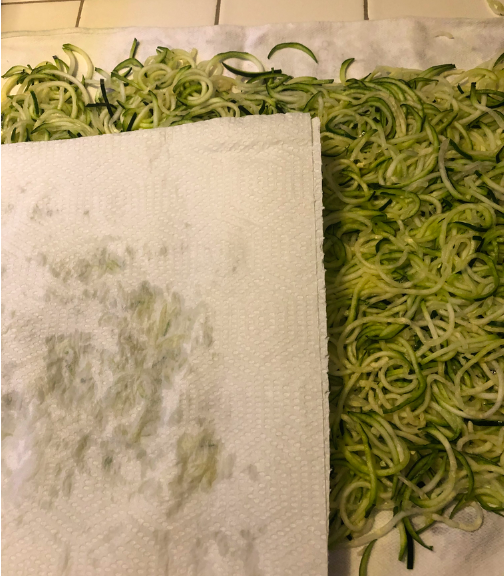
6. Cover a baking sheet with parchment and spray the parchment with a little oil. I use an oil mister now because I read that spray oils contain traces of benzene and butane. Yuk. Spread the zoodles onto the baking sheet in as thin a sheet as possible. Aim for a single layer.
7. Bake the zoodles at 350ºF for 15–20 minutes. Mine baked perfectly in 20 minutes. They were just a little past the al dente pasta stage.
How to make sauteed zoodles
1. Spiralize, sweat, and blot the zoodles as in steps 1-5 for the baked noodles above.
2. Stir-fry them in a little butter or olive oil (or a mixture of both) over medium-high heat for 3-5 minutes.
Find Your Easy tips
· Don’t salt your zoodles again after you have salted them to remove the moisture
· Don’t overcook them
· Don’t cover them while cooking. It will keep the moisture in and make them soggy
How to use zoodles
My favorite way to use zoodles is just to top them as I would pasta. Their mild taste makes them work in many different recipes. But here’s a list of delicious ways to get your creative juices flowing (literally):
- As pasta in Italian dishes
- Top with marinara, clam sauce, pesto, Alfredo
- Use in place of noodles in shrimp scampi, carbonara, or chicken parmesan
- As rice in Asian dishes
- Top with your favorite stir-fry
- Make them the star
- Add some olive oil, melted butter, minced garlic, and parmesan
- Make them into sesame noodle zoodles
- Add olive oil, cherry tomatoes, fresh mozzarella, and chopped fresh basil to make zoodle caprese
- Add vegetables to make spring vegetable primavera
- Roast them with other spiralized vegetables and herbs and make spiralized veggie egg nests
- Instead of using them in place of rice in Asian dishes, stir-fry them as one of the vegetables or make peanut chicken zucchini noodles
- Make zoodle ramen or French onion zoodle bake or chicken zoodle soup (I knew there had to be zoodle soup recipes out there somewhere)
- Make zucchini pad Thai
Need more zoodle inspiration?
Check out Inspiralized for some delicious zucchini noodle recipes Ali has some wonderful zoodle recipes and a lifestyle blog with a strong emphasis on her little growing family, which touches my heart.
Try raw zoodles and other veggies besides zoodles. Beets and carrots make beautiful spirals that can be roasted to top salads or served as sides. Curly sweet potato fries are a delicious treat.
No, these aren’t exactly the same as regular pasta, but they are a fabulous, nutritious pasta alternative that can help cut carb cravings. And you don’t have to be on a low-carb diet to try and enjoy them!
Do you have a favorite way to make zoodles or a special zoodles recipe to use them in? Please leave a comment below.


